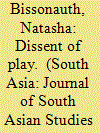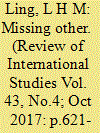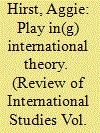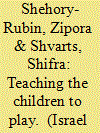|
|
|
Sort Order |
|
|
|
Items / Page
|
|
|
|
|
|
|
| Srl | Item |
| 1 |
ID:
171304


|
|
|
|
|
| Summary/Abstract |
Sa’dia Rehman’s Lotah Stories was an art installation that was exhibited in the bathrooms of Queens Museum of Art in New York during the 2005 Fatal Love show, the first exhibition on South Asian American art in a major venue. Given its unusual placement outside the white cube, one’s encounter with Lotah Stories is jarring. Moreover, Rehman’s crass subject matter incites carnivalesque laughter. This article argues that Rehman’s aesthetics give form to the dissent of play; by situating Rehman within the age of identity art and the emergence of South Asian diasporic art from the 1990s onwards, I maintain that attention to play as a political aesthetic can reshape the way we see difference.
|
|
|
|
|
|
|
|
|
|
|
|
|
|
|
|
| 2 |
ID:
175324


|
|
|
|
|
| Summary/Abstract |
In this paper, we take the emergence of the Her Majesty’s Armed Forces toy range in 2009 as a starting point for thinking through the domestication of geopolitics through practices of play. Empirically, the paper draws upon substantive, innovative and original research undertaken with children in their homes, via a series of play ethnographies; conceptually, the paper draws upon the notion of ‘domestication’ and argues that ideas from these literatures might be usefully adopted as a means of reconfiguring popular geopolitics. In so doing, we argue not only that toys, games and play warrant much greater attention as forms of popular geopolitics, but also that the idea of domestication has much to offer wider conceptions and framings around popular geopolitics itself. The paper thus advances claims for a significant reformulation of popular geopolitics as an encounter between texts, objects, bodies and practices. More specifically, the rich ambiguity of the observed practices emerging from our play-centred ethnographic approach speaks clearly to the need to avoid prioritising the public over the private, cultural producers over audience, and the discursive over the affective in our theorisations of domestication. While we should be attentive to the highly orchestrated practices of anticipating domesticity and the multiple sites of geographical production assembled though these practices, we should not ignore the excess inherent within the incomplete, experimental process of domestication.
|
|
|
|
|
|
|
|
|
|
|
|
|
|
|
|
| 3 |
ID:
155152


|
|
|
|
|
| Summary/Abstract |
As Andrew Linklater has shown, Europeans have decreased their tolerance for, or endorsement of, violence over the centuries. Various international and domestic conventions demonstrate the point. This accomplishment rightfully deserves celebration. But herein lies the rub. While Linklater recognises the role of imperialism and colonialism in perpetrating global violence, he does not grant equal opportunity to the Rest in contributing to the world’s new moral heights. Linklater assumes, for instance, that Las Casas never talked with indigenes to realise that they, too, warrant recognition as human beings; Catholic piety alone sufficed. The West thus towers in singular triumph, embedding International Relations (IR) in what I call Hypermasculine Eurocentric Whiteness (HEW). Still, the Other retains a sense of its Self. An effervescent spirit of play enables resilience and creativity to co-produce our world-of-worlds. Come out and play!, I urge. It’s time to shed IR’s ‘tragedy’ for the sparkle within.
|
|
|
|
|
|
|
|
|
|
|
|
|
|
|
|
| 4 |
ID:
168881


|
|
|
|
|
| Summary/Abstract |
While the study of games and gaming has increased in International Relations in recent years, a corresponding exploration of play has yet to be developed in the field. While play features in several key areas – including game theory, videogames and popular culture, and pedagogical role-plays and simulations – little work has been done to analyse its presence in, and potentials for, the discipline. The aim of this article is to introduce the study of play to IR. It does this by demonstrating that play is political, and that it is at work across the global arena. Drawing on the deconstructive tradition associated with Jacques Derrida, its core contribution is a theorisation of play. The central argument developed is that play is (auto)deconstructive. By this I mean (1) that play precipitates an unravelling of any attempt at its conceptualisation, and (2) that this illustrates the value of a deconstructive approach to international theory. This claim is substantiated through an analysis of four key binary oppositions derived from Johan Huizinga's Homo Ludens. Having shown how play powerfully deconstructs its own conceptual foundations, I argue that a playful approach offers a robust challenge to entrenched assumptions in international theory.
|
|
|
|
|
|
|
|
|
|
|
|
|
|
|
|
| 5 |
ID:
098058


|
|
|
|
|
|
|
|